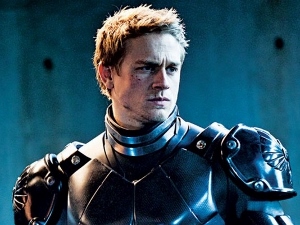[8]
Pacific Rim is good, dumb summer fun. It’s beautiful, sexy, exciting, funny, and it kinda made me feel like a kid again. The premise involves Kaiju and Jägers… scratch that. Let’s call it like it is: this movie is about big fucking robots fighting big fucking monsters. The monsters come from another dimension, entering our world from the bottom of the Pacific Ocean. The robots, each manned by two psychically linked people (often blood relatives), are humanity’s last hope for survival. The concept sounds like the germ of another big, loud, stupid summer movie — you know, the kind Michael Bay makes. But director Guillermo del Toro (Hellboy, Pan’s Labyrinth) handily beats Bay at his own game with Pacific Rim, imbuing the film with more style and substance than any of Bay’s Transformers movies ever had.
Del Toro sets the tone of the film right away, and you have the option of embracing it or going home. It’s a stylized comic book movie for kids and kids at heart. The sets, wardrobe, and cheeky supporting performances all encourage you to set your cynicism aside. As a kid of the 1980s, I was glad to see a fanciful approach to big-budget action flicks again. Del Toro’s approach lets him get away with more poetic license and suspension of disbelief than Bay or Christopher Nolan (The Dark Knight) can afford themselves — their hyper-real approach to fantasy film making is old-hat now, anyway.
There are two more ways in which Del Toro shows up his contemporaries here. One is in visual and editorial style. I thank the fucking movie gods that this movie isn’t orange and teal. Del Toro embraces every color of the goddamned rainbow and I applaud him for it. (This shouldn’t be a big deal, but it is!) And unlike much of Bay’s work or Zack Snyder’s abominable Man of Steel, I can actually discern what is happening shot-to-shot in Pacific Rim. The battle sequences aren’t incomprehensible blurs like they are in those other movies, and I have to think it’s probably because Del Toro is more confident in his narrative, staging, and composition.
Finally, and most importantly, Pacific Rim distinguishes itself from the pack by having likeable characters that I cared about. Charlie Hunnam (Sons of Anarchy) carries the movie very well, demonstrating charisma in addition to smoldering good looks (thank you, Guillermo, for the gratuitous shirtless scenes!) After his Jäger co-pilot and brother (Diego Klattenhoff) is killed, Hunnam’s character strikes up a new bond with his training instructor (Rinko Kikuchi), who is haunted by memories of her own. The supporting characters are all stereotypes of one kind or another, but they add personality and charm to the proceedings. I especially liked Idris Elba as the Jäger pilots’ commander and Ron Perlman as a Kaiju black-market organ dealer. Charlie Day and Burn Gorman bring comic relief as two bickering scientists, while Max Martini and Robert Kazinsky are memorable as Australian father/son Jäger co-pilots who never give up the good fight — not even when their robot loses power.
Pacific Rim is meant to be surface-level entertainment, but while watching its international cast of characters make a unified effort to save the planet, I was struck by something mythologist Joseph Campbell once said: “We need myths that will identify the individual not with his local group but with the planet.” I was also struck by the depiction of military leaders working with scientists to solve a mutual problem. It may just be my liberal heart beginning to glow after years of dormancy, but if our kids want to see big, stupid Hollywood movies, this robot/monster free-for-all is not without moral value.



